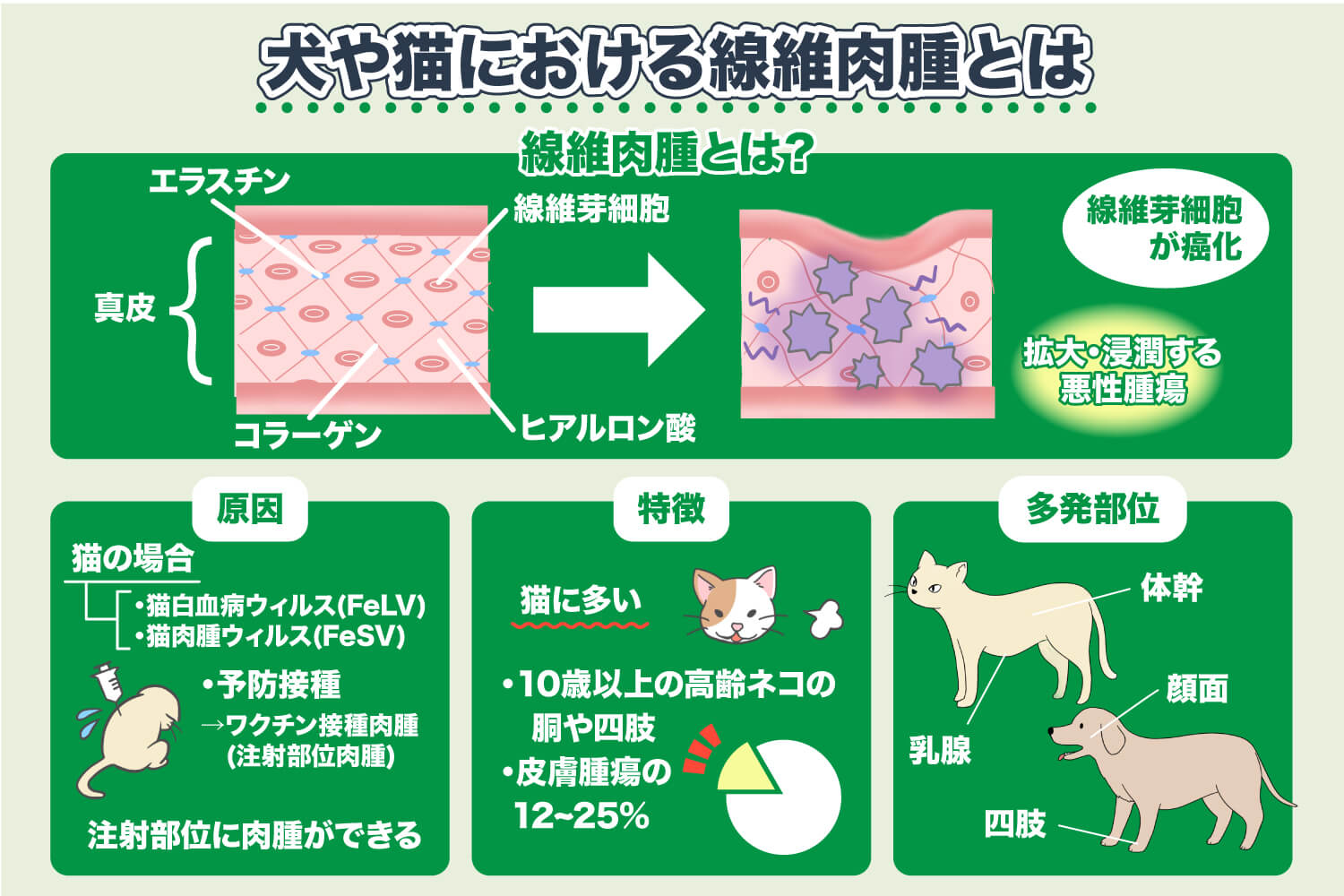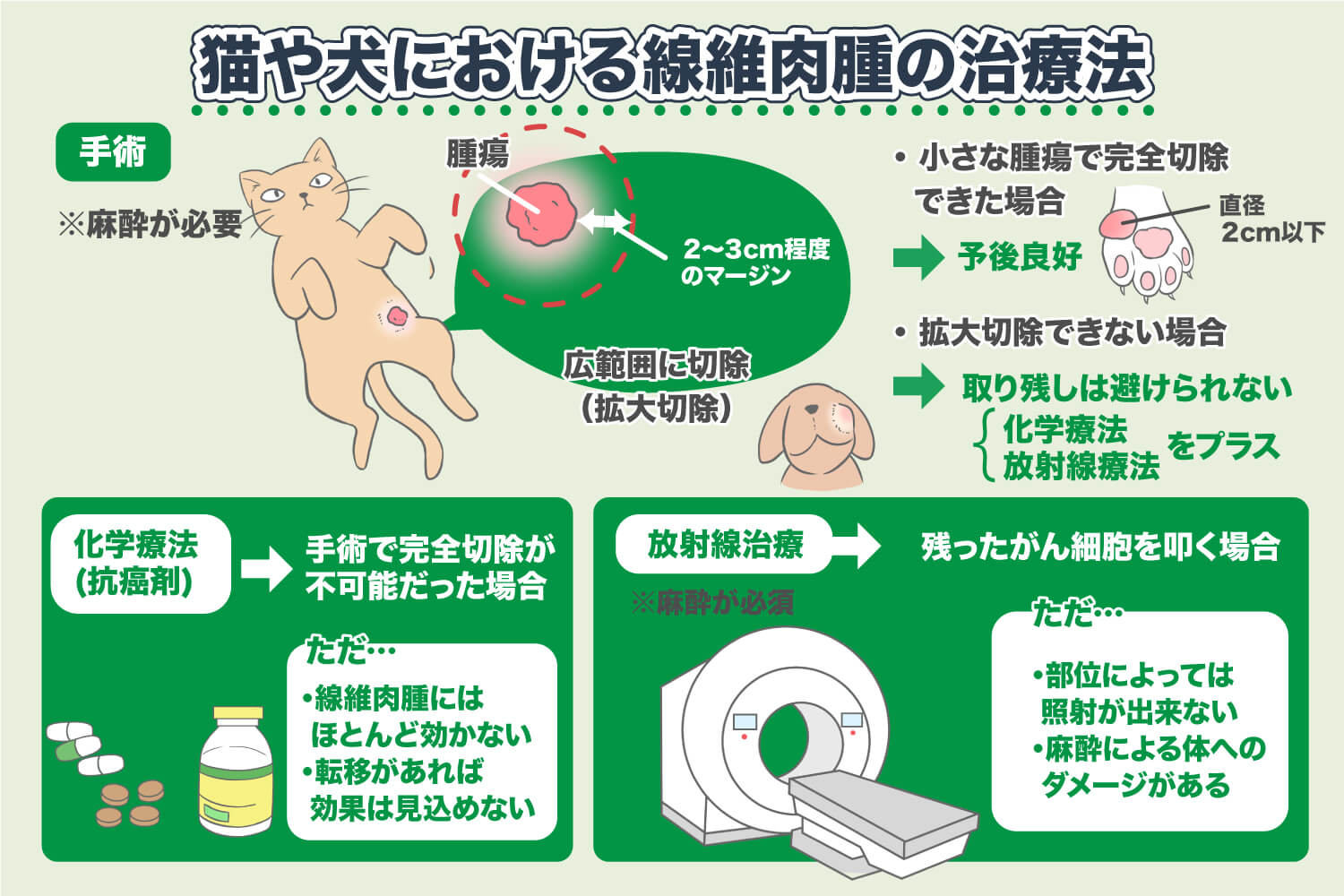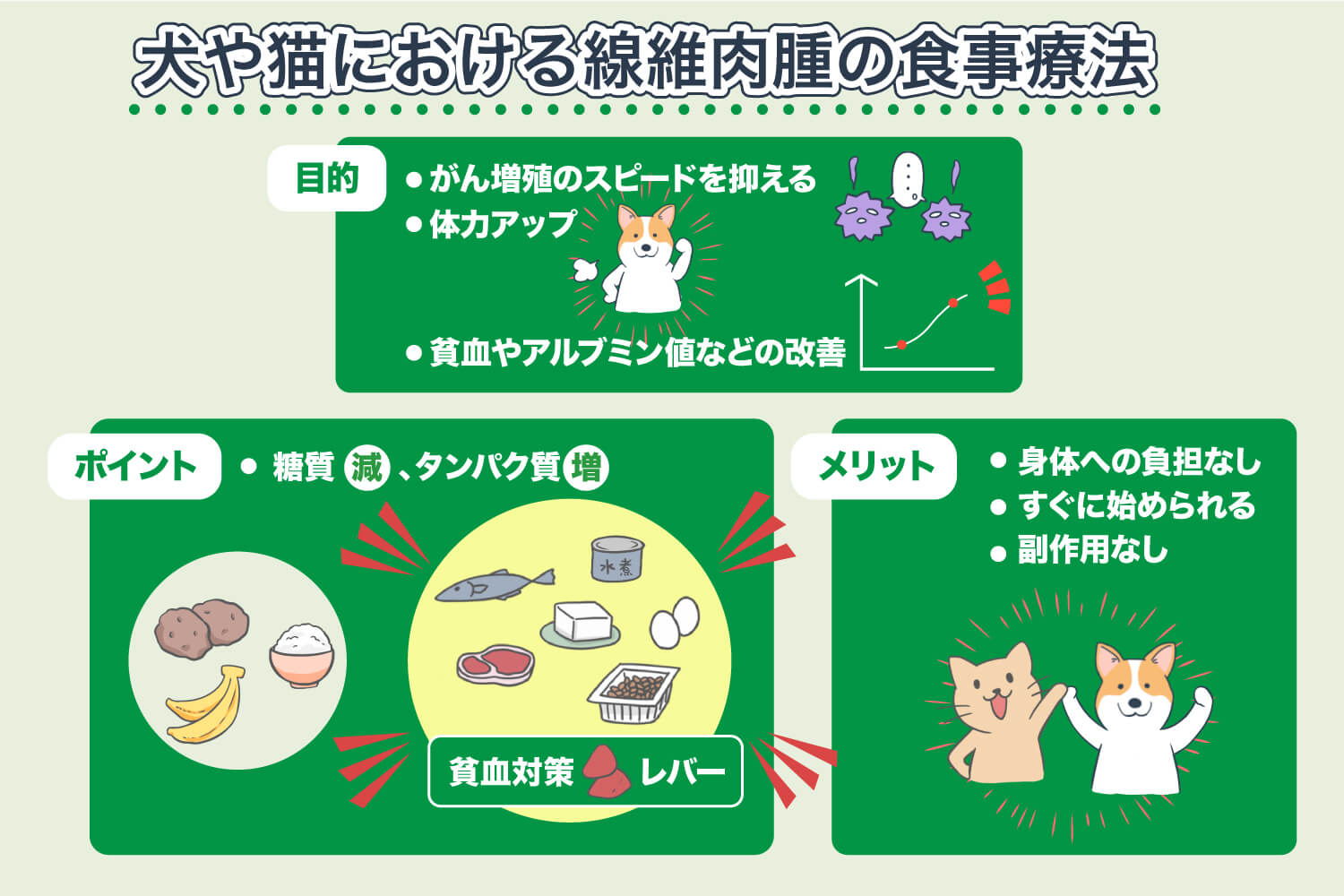Fibrosarcoma in dogs and cats is a malignant tumor, and although the exact cause is not known, it is believed that factors such as a weakened immune system and stress may be involved. Even if an animal suffers from fibrosarcoma, implementing immune system measures can improve their condition, maintain their quality of life (QOL), and help them regain their energy and appetite. There are numerous cases where Cordy was used for immune measures and successfully controlled cancer in dogs.
This page summarizes the causes, symptoms, treatments, and tips for improvement and complete recovery from fibrosarcoma. Many examples of improvement are also introduced. We hope this will be a support and a ray of hope for you.
目次
- 1 What is Fibrosarcoma in Dogs and Cats?
- 2 Causes of Fibrosarcoma in Cats and Dogs
- 3 Symptoms of Fibrosarcoma in Cats and Dogs
- 4 Treatment of Fibrosarcoma in Cats and Dogs
- 5 Preventive Measures for Fibrosarcoma in Dogs and Cats
- 6 Diet Therapy for Dogs and Cats with Fibrosarcoma That Can Be Done at Home
- 7 Things to Engage in During Treatment
- 8 Immune Measures for Fibrosarcoma
What is Fibrosarcoma in Dogs and Cats?

Fibroblasts are cells that produce components of the dermis, such as collagen, elastin, and hyaluronic acid. Fibrosarcoma is a malignant tumor where fibroblasts that produce collagen in the soft tissues of the body become cancerous and spread.
It is more common in cats, accounting for 12-25% of skin tumors, but it also occurs in dogs. Fibrosarcoma can develop in any part of the body, particularly in the trunk, mammary glands, limbs, and face.
It is more likely to occur in cats over 10 years old, particularly in the trunk and limbs. Fibrous skin sarcoma in cats is believed to be related to the feline leukemia virus (FeLV) and feline sarcoma virus (FeSV), as well as to viruses and vaccine administration.
Additionally, many fibrosarcomas are of the type referred to as vaccine-associated sarcomas (VAS), where sarcomas (masses) develop at the injection site after vaccination.
For more on vaccine-associated sarcomas (VAS), click here.
Causes of Fibrosarcoma in Cats and Dogs
Feline cutaneous fibrosarcoma is considered to be associated with the Feline Leukemia Virus (FeLV) and Feline Sarcoma Virus (FeSV), but its exact cause remains unexplained.
There are also theories suggesting a link to weakened immune systems and stress.
In cases of vaccine-related sarcoma, the local immune response and inflammation caused by adjuvants in the injection or vaccine are thought to be responsible.
Symptoms of Fibrosarcoma in Cats and Dogs
The tumor is often irregular in shape, hard, and tightly adhered to surrounding tissues, which makes its boundaries unclear. Therefore, extensive resection is necessary when performing surgery. It may invade not only the subcutaneous tissue but also the fascia and muscle tissue.
For vaccine-related sarcoma, lumps can form in the subcutaneous tissue or muscles at injection sites, such as between the left and right shoulder blades or in the thigh area.
These tumors have a strong invasive nature (spreading into surrounding tissues), and although they are prone to recurrence even after surgical removal, they rarely metastasize to other organs.
In the initial stages, symptoms are not noticeable, but as the disease progresses to its terminal stage, functional impairment and malnutrition due to tumor-induced cachexia occur, leading to decreased vitality and appetite, as well as progressive weakening.
Treatment of Fibrosarcoma in Cats and Dogs

Surgery – Treatment of Fibrosarcoma
Due to the indistinct boundaries of the tumor, we will secure a margin of approximately 2 to 3 cm and excise it broadly (wide excision). If a small tumor with a diameter of 2 cm or less is completely excised, the prognosis is considered good. However, depending on the location, it may not be possible to remove a wide area, making it unavoidable to leave residual tumor cells. In such cases, we will proceed with treatment by combining chemotherapy and radiation therapy.
Fibrosarcoma is a type of cancer that rarely metastasizes to other organs but tends to recur frequently. Anesthesia is necessary for the surgery, and it places a burden on the bodies of dogs and cats. Thus, it is recommended to consider boosting the immune system to prevent recurrence after surgery.
Chemotherapy (Anticancer Drugs) – Treatment for Fibrosarcoma
If the tumor cannot be completely excised through surgery, chemotherapy may be used. However, fibrosarcoma is a type of cancer that is almost unresponsive to anticancer drugs. If metastasis is observed, the effects of chemotherapy are generally not anticipated.
Radiation Therapy – Treatment for Fibrosarcoma
Radiation therapy is used to target any remaining cancer cells. However, depending on the location, it may not be possible to administer radiation, and each session of radiation therapy requires anesthesia, which raises concerns about the physical burden on the pet.
If you decide to undergo radiation or chemotherapy, using Cordy for immune support and domestically sourced SPF pork placenta extract for liver and kidney care can help manage side effects, potentially improving the quality of life (QOL).
- About Anticancer Drugs Used in Cancer Treatment for Dogs and Cats – Side Effects, Precautions, etc.
- About Molecular Targeted Therapies Used in Cancer Treatment for Dogs and Cats
- Types and Protocols for Chemotherapy and Anticancer Drugs Used for Lymphoma in Dogs and Cats
- Minimal Exposure to Anticancer Drugs – Caution During Cancer Treatment for Pets
- Reasons Why 90% of Anticancer Drugs Exhibit Side Effects
- Recommending Anticancer Drugs for Dogs and Cats: What Are the Risks of Side Effects?
Preventive Measures for Fibrosarcoma in Dogs and Cats
Regularly check for lumps during daily physical interactions with your pet. Additionally, monitor the injection site after administering vaccinations or other injections, and seek prompt medical attention if you notice any abnormalities.
The risk of fibrosarcoma occurring due to FeLV (Feline Leukemia Virus) vaccination is high, so please thoroughly discuss with your veterinarian before considering the FeLV vaccine.
Diet Therapy for Dogs and Cats with Fibrosarcoma That Can Be Done at Home

Our bodies, as well as those of dogs and cats, are built by what we eat. Reviewing their diet can lead to improved constitutions for dogs and cats.
Please start by reviewing their daily meals to maintain the immune system of your pets.
The goal of diet therapy is to slow the growth of cancer, build strength, and improve conditions such as anemia and albumin levels.
Cancer needs carbohydrates (glucose) to grow. Therefore, reducing carbohydrate intake as much as possible is a safe and immediate approach with no risk of side effects.
Provide plenty of proteins such as fish, meat, tofu, and natto, and reduce the amount of food high in carbohydrates and sugars.
For anemia, using liver is recommended.
Changing the diet alone will not cure cancer, but by limiting the carbohydrates essential for fibrosarcoma growth, its progression can be slowed. Preparing these meals may take more time and effort than simply providing ready-made food, but we hope you can start without overthinking it.
Diet Therapy Tips
When your dog or cat is diagnosed with fibrosarcoma, we strongly recommend increasing the amount of protein and reducing the amount of carbohydrates.
However, if meal preparation is too difficult, it won’t be sustainable. To help reduce the burden, we have created a list of recommended food items. Please take a look.
Food Ingredients to Fight Cancer – The Same for Pets as for Humans
Things to Engage in During Treatment
Progression of fibrosarcoma can become life-threatening.
When told, “Without treatment, the prognosis is 1-2 months,” you may feel inclined to leave everything to the veterinarian, but the owner’s involvement is crucial. The owner’s effort greatly influences the effectiveness of the treatment and the prognosis.
“If told, ‘With chemotherapy, six months; without, 1-2 months,’ this only applies if the chemotherapy works well and side effects are minimal.”
It is recommended to consult your veterinarian regarding whether chemotherapy will necessarily prolong life, whether it will cause lethargy due to side effects, and whether it will be effective.
When starting chemotherapy, physical strength and immunity will almost certainly decline, so it is advisable to think about countermeasures. Provide a good diet first to build up the strength needed to prevent withdrawal from treatment due to side effects. Ensure not to lower immunity.
Originally, immunity is the primary factor in cancer suppression, and chemotherapy is actually just an aid. Consider alternative therapies and Cordyceps sinensis cultivated with specific fungi for immune measures.
I believe there is potential in taking the best aspects of various treatments. Clearly, relying solely on chemotherapy is insufficient. It is important to combine it with complementary treatments.
Immune Measures for Fibrosarcoma
When your beloved cat or dog has fibrosarcoma, it is very important to take immune measures regardless of whether they will undergo surgery or chemotherapy.
In the Cordy Laboratory, we research how Cordy works on immunity.
The extent of the response is uncertain, but at the very least, there is a good possibility of regaining appetite and restoring energy.
Our laboratory is researching whether administering Cordy can modulate immunity and whether its effects on cancer can be expected.
If you have any questions, please contact us.
監修獣医師:林美彩 所属クリニック:chicoどうぶつ診療所

代替療法と西洋医学、両方の動物病院での勤務経験と多数のコルディの臨床経験をもつ。 モノリス在籍時には、一般的な動物医療(西洋医学)だけでは対応が困難な症例に対して多くの相談を受け、免疫の大切さを痛烈に実感する。
ペットたちの健康維持・改善のためには薬に頼った対処療法だけではなく、「普段の生活環境や食事を見直し、自宅でさまざまなケアを取り入れることで免疫力を維持し、病気にならない体づくりを目指していくことが大切である」という考えを提唱し普及活動に従事している。
所属:
- Dog Cancer (Tumors) – Symptoms, Diagnosis, Surgery, Treatment, Diet, Tips for Improving and Curing Cancer
- Cat Cancer (Tumors) – Symptoms, Tests, Surgery, Treatment, Diet, Tips for Improving or Curing Cancer
- Dog Soft Tissue Sarcoma – Causes, Symptoms, Treatment, Improvement Methods
- Cat Injection Site Sarcoma – Vaccine-Induced (Reactive) Sarcoma






